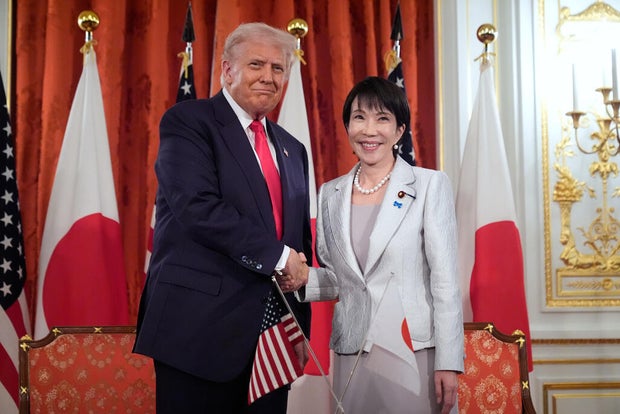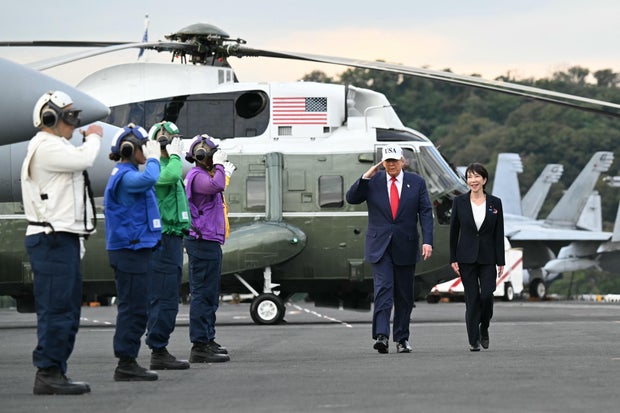President Trump signed a trade agreement with Japanese Prime Minister Sanae Takaichi on Tuesday, as he focuses on cementing deals with key U.S. trading partners during his nearly weeklong trip through Asia.
The deal — which the two countries agreed to over the summer — will see the U.S. charge 15% tariffs on imported Japanese goods, lower than the 25% initially threatened by Mr. Trump. In exchange, Japan has pledged to invest $550 billion in U.S. industry and open its market to American rice, cars and defense equipment. It’s not yet clear exactly where those invested dollars would go.
Mr. Trump and Takaichi, who became Japan’s first ever female prime minister just last week, also signed a framework that calls for the U.S. and Japan to cooperate on supplying critical minerals and rare earth metals to each other. Mr. Trump has sought mineral deals with countries including Australia and Ukraine in recent months, as China imposes new restrictions on its exports of rare earths, which are essential for computer chips, aerospace and other technology, as part of a tit-for-tat trade war with Washington.
During brief remarks to the press before a signing ceremony on Tuesday morning, Mr. Trump touted the trade deal as “very fair.”
“We’re going to do tremendous trade together, I think more than ever before,” he said, calling Japan an “ally at the strongest level.”
Japan is the United States’ fifth-largest trading partner, according to federal statistics. Japan bought $79.7 billion worth of American goods last year, and the U.S. imported $148.2 billion worth of Japanese goods.
More than one-third of U.S. imports from Japan last year — or $52.3 billion — were cars and car parts, powered by Japan’s massive auto industry, according to federal data.
The American and Japanese leaders, whose countries share a rivalry with China, also spoke about defense cooperation, with Mr. Trump thanking Japan for its weapons orders from the U.S.
During their meeting, which was held at Tokyo’s Akasaka Palace guest house, Takaichi called the bilateral relationship the “greatest alliance in the world” and said she would like to work with the U.S. toward a “shared goal of achieving a free and open Indo-Pacific.”
It was the first meeting for Mr. Trump with Takaichi, a staunch conservative who took office last week. She was close with the late Prime Minister Shinzo Abe, a friend of Mr. Trump’s up until his assassination in 2022.
“He was a great friend of mine and a great friend of yours,” the U.S. president said as he shook Takaichi’s hand on Tuesday. Their meeting came within hours of a court hearing in Tokyo during which Abe’s assassin pleaded guilty to murdering the former premier with a homemade gun.
In a moment of levity, Takaichi apologized to reporters for a late start to the meeting, saying she was watching game three of the World Series. The Los Angeles Dodgers’ two-way star, Shohei Ohtani, is a native of Japan and has a large following in his home country. After an exciting, 18-inning contest, Los Angeles pulled ahead for a 6-5 victory.
Later Tuesday, Mr. Trump touched down by helicopter with Takaichi aboard the USS George Washington aircraft carrier at the Yokosuka Naval Base, south of Tokyo, and they saluted service members before the president delivered an adress to the troops.
Mr. Trump was heard praising Takaichi, predicting that she would “go down as one of the great prime ministers.”
Following the appearance on the ship, the president was due to fly back to Tokyo to attend a business leadership reception.
On Monday, the president met with Japanese Emperor Naruhito at Tokyo’s imperial palace.
Trump to visit South Korea next — and meet with China’s Xi Jinping
South Korea is the next and final stop on the president’s trip, which started over the weekend in Kuala Lumpur, Malaysia — a visit marked by trade frameworks between the U.S. and Cambodia, Malaysia, Thailand and Vietnam.
On the South Korean front, Treasury Secretary Scott Bessent told reporters he doesn’t expect to finalize a trade deal with the country when the U.S. president visits on Wednesday, but said he thinks they’re close. Mr. Trump and the South Korean government announced a framework over the summer that was similar to the Japan deal, with 15% tariffs on South Korean goods and investments pledged in the U.S.
The multi-stop Asia trip will culminate with a meeting with Chinese President Xi Jinping in South Korea on Thursday at a summit of the Asia-Pacific Economic Cooperation (APEC) forum, as they look to put an end to the ongoing trade tensions between the U.S. and China.
On his way to Tokyo, Mr. Trump predicted the U.S. and China would complete a trade agreement before he returns to Washington later in the week. The two sides have had a rocky relationship in recent months. The president threatened to impose an additional 100% tariff on imports from China — for a total rate of 140% — starting Saturday, Nov. 1, lashing out against new export restrictions imposed by Beijing.
On his way to Tokyo, Mr. Trump also said he would like to meet with North Korean leader Kim Jong Un, although there are no such plans for a meeting.


